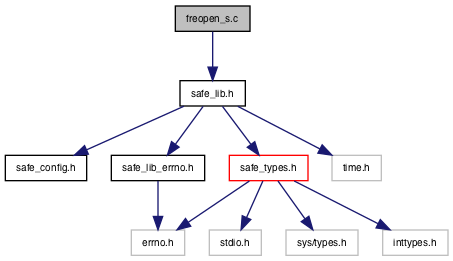freopen_s.c File Reference
#include "safe_lib.h" Include dependency graph for freopen_s.c:
Include dependency graph for freopen_s.c:Functions | |
| EXPORT errno_t | freopen_s (FILE *restrict *restrict newstreamptr, const char *restrict filename, const char *restrict mode, FILE *restrict stream) |
The freopen_s function first, attempts to close the file associated with the stream, ignoring any errors. More... | |
Function Documentation
◆ freopen_s()
| EXPORT errno_t freopen_s | ( | FILE *restrict *restrict | newstreamptr, |
| const char *restrict | filename, | ||
| const char *restrict | mode, | ||
| FILE *restrict | stream | ||
| ) |
The freopen_s function first, attempts to close the file associated with the stream, ignoring any errors.
Then, if filename is not null, attempts to open the file specified by filename using mode as if by fopen, and associates that file with the file stream pointed to by stream. If filename is a null pointer, then the function attempts to reopen the file that is already associated with stream (it is implementation defined which mode changes are allowed in this case).
- Remarks
- SPECIFIED IN
- C11 standard (ISO/IEC 9899:2011): K.3.5.2.2 The freopen_s function (p: 590) http://en.cppreference.com/w/c/io/freopen
- Parameters
-
[out] newstreamptr pointer to a FILE stream that will be updated by this function call [in] filename file name to associate the file stream to [in] mode as in fopen [in] stream the file stream to modify
- Precondition
- Neither streamptr, stream nor mode shall be a null pointer.
If the file was reopened successfully, then the pointer to the FILE pointed to by newstreamptr will be set to the pointer to the object controlling the opened file. Otherwise, the pointer to the FILE pointed to by newstreamptr will be set to a null pointer.
- Returns
- The freopen_s function returns zero if it reopened the file. If not or there was a runtime-constraint violation, freopen_s returns a nonzero error code, and sets newstreamptr to NULL. If there is a runtime-constraint violation, freopen_s does not attempt to reopen the file. Sets the newstreamptr on success.
- Return values
-
EOK on success ESNULLP when any argument is a NULL pointer > 0 any other errno
